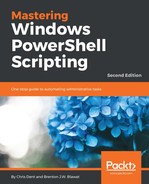So far, we have explored one-off assignments of simple value types, and while these values are considered objects, they are still (reasonably) simple objects. Once created, variables holding simple values such as integers and strings can diverge without affecting one another.
That is, the numeric value assigned to each variable is independent after creation:
$i = $j = 5
Each of the following commands increases the value held in the variable i by creating a new integer object (based on the original object):
$i = $j = 5 $i++ $i += 1 $i = $i + 1
If each statement is executed in turn, the variable i will be 8 and the variable j will be 5.
When changing the value of a property on a more complex object, the change will be reflected in any variable referencing that object. Consider this example where we create a custom object and assign it to two variables:
$object1 = $object2 = [PSCustomObject]@{
Name = 'First object'
}
A change to a property on an object will be reflected in both variables. The action of changing a property value does not create a new copy of the object. The two variables will continue to reference the same object:
PS> $object1.Name = 'New name'
Write-Host $object2.Name
New name
The same applies when using nested objects: objects that use other objects as properties:
PS> $complexObject = [PSCustomObject]@{
OuterNumber = 1
InnerObject = [PSCustomObject]@{
InnerNumber = 2
}
}
$innerObject = $complexObject.InnerObject
$innerObject.InnerNumber = 5
Write-Host $complexObject.InnerObject.InnerNumber
5
